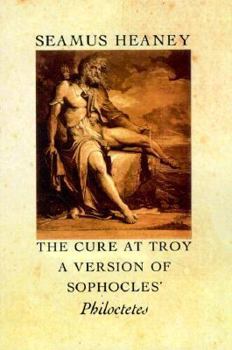The Cure at Troy: A Version of Sophocles' Philoctetes
Select Format
Select Condition 
Book Overview
The Cure at Troy is Seamus Heaney's version of Sophocles' Philoctetes. Written in the fifth century BC, this play concerns the predicament of the outcast hero, Philoctetes, whom the Greeks marooned on the island of Lemnos and forgot about until the closing stages of the Siege of Troy. Abandoned because of a wounded foot, Philoctetes nevertheless possesses an invincible bow without which the Greeks cannot win the Trojan War. They are forced to return to Lemnos and seek out Philoctetes' support in a drama that explores the conflict between personal integrity and political expediency.
Heaney's version of Philoctetes is a fast-paced, brilliant work ideally suited to the stage. Heaney holds on to the majesty of the Greek original, but manages to give his verse the flavor of Irish speech and context.Format:Paperback
Language:English
ISBN:0374522898
ISBN13:9780374522896
Release Date:December 1991
Publisher:Farrar, Straus and Giroux
Length:96 Pages
Weight:0.36 lbs.
Dimensions:0.4" x 5.4" x 8.0"
Related Subjects
Betrayal Forgiveness Friendship Heroism Humanity Isolation Redemption Sacrifice Warfare DramaCustomer Reviews
4 ratings
Don't forget the Irish politics
Published by Thriftbooks.com User , 16 years ago
Other reviewers have noted that Heaney's translation, like any literary translation, serves a different purpose for its audience than the original work did for its audience. I just wanted to add that this translation is not _just_ a modernization of Sophocles' work. As an Irish unionist, Heaney subtly refigures the drama as a political treatise on modern Ireland, which was prominently expressed when former Irish President Mary Robinson cited The Cure at Troy in her inaugural speech in 1994. Leave it to a master like Heaney to produce a layered work with several valid levels of interpretation.
Seamus!
Published by Thriftbooks.com User , 21 years ago
"The Cure at Troy," translated by Seamus Heaney offers a delightful translation of Sophocles' "Philoctetes." With a compelling tale from anchient times layed out before him, Heaney applies colloquial speach diction to the play. This accessability offers the audience a window into the basic moral struggle occuring at the heart of the work. A finly crafted story draws the reader to the characters. A worthwhile read.
The Cure At Troy
Published by Thriftbooks.com User , 21 years ago
Seamus Heaney pulls through again with his brilliant translation of Sophocles' Philoctetes. The tragic story of the forgotten hero, Philoctetes, provides a unique insight into the conflicts between personal moral beliefs and political calling. Odysseus persuades the heroic Neoptolemus into tricking the mamed Philoctetes into giving up the bow of Hercules. This act challenges the admired traits of the ancient world and draws into question the importance of personal beliefs. As each character represents a different aspect of the Greek world, a fight for beliefs - fidelity, pity, piety - endures. As for the translation itself, Heaney provides a beautiful interpretation of the story as seen in the words of the chorus:History says, Don't hopeOn this side of the grave.But then, once in a lifetimeThe longed-for tidal waveOf justice can rise up,And hope and history rhyme.This enriched translation strays slightly from the ancient text in order to enhance the understanding of the modern reader. Overall, this fast-moving play entices and enchants through a lyrical harmony like no other. Bravo, Seamus. Bravo.
The Cure at Troy yields a measured dose
Published by Thriftbooks.com User , 24 years ago
Seamus Heaney's version of trials for the Greek archer entrusted with Hercules' infallible bow and arrows gives us affirmation and points of reflection. Heaney does not dash the ancient dialogue style on the rocky island; rather it is enriched for the modern reader. Honoring the timelessness of Sophocles, Heaney allows today's reader to make comparisons of private nature and choices with the public need and will. The hero, Achilles' son, Neoptolemus, finds that the strategy to take Troy for the Greeks runs counter to his nature of honesty and integrity. We wrestle with him over the choices. We tumble with him when he loses his grip. We crawl back to sure footing along side the hero. I found myself understanding the characters based on different experiences in my life. Philoctetes bemoans his ill-fated injury which leaves him abandoned and full of vengeance. Human empathy allows him to examine his tight grip on his woundedness without denying what he has endured. Odysseus, the pragmatic lieutenant of war, is shown for his utility and foibles. As in all Greek plays, the chorus calls the characters and the reader to reflection, "...For my part is the chorus, and the chorus is more or less a borderline between the you and the me and the it of it." Heaney got the "it of it" for us to take our own measure.





